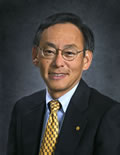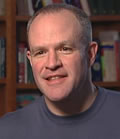

Berkeley Lab’s Terry Hazen, who heads the Earth Sciences Division’s Center for Environmental Biotechnology, gave the keynote address – “Bioremediation, the Hope and the Hype” – at last month’s Bioremediation and Prevention Conference in Winnipeg, Canada, sponsored by the Manitoba Environmental Industries Association. Hazen talked about when it’s best to clean up contaminated sites with engineered bioremediation and when it’s better to rely on natural attenuation – what he called the good, the bad and the ugly of biological processes for environmental cleanup. Go here for a video of his talk. ![]()
 QUEST Interactive, one of the liveliest platforms in KQED QUEST’s multiplatform science and environment series, hosts bloggers on numerous topics, including Berkeley Lab’s James Gunshinan on energy efficiency and, until he moved on last year, postdoc Kyle Dawson on astrophysics. “We're looking for someone who can cover timely science issues in their field of expertise and can explain them to the public in an engaging way,” says QUEST’s Lauren Sommer. “We ask people to post twice a month and we do pay” (provided institutions allow). Go here for QUEST’s blogging guidelines. And if quantum physics is your beat, also check out InterActions.org, where the successful Quantum Diaries blogging group will soon be revived. Elizabeth Clements of the Interactions collaboration says they already have eight bloggers lined up from around the world but are looking for even more diversity. Check out the Quantum Diaries guidelines here.
QUEST Interactive, one of the liveliest platforms in KQED QUEST’s multiplatform science and environment series, hosts bloggers on numerous topics, including Berkeley Lab’s James Gunshinan on energy efficiency and, until he moved on last year, postdoc Kyle Dawson on astrophysics. “We're looking for someone who can cover timely science issues in their field of expertise and can explain them to the public in an engaging way,” says QUEST’s Lauren Sommer. “We ask people to post twice a month and we do pay” (provided institutions allow). Go here for QUEST’s blogging guidelines. And if quantum physics is your beat, also check out InterActions.org, where the successful Quantum Diaries blogging group will soon be revived. Elizabeth Clements of the Interactions collaboration says they already have eight bloggers lined up from around the world but are looking for even more diversity. Check out the Quantum Diaries guidelines here.
 In the News: Steve Chu Gets an A+ on Capitol Hill
In the News: Steve Chu Gets an A+ on Capitol Hill [FYI: The AIP Bulletin of Science Policy News] "You get an A+," Senate Budget Committee Chairman Kent Conrad (D-ND) told Secretary of Energy Steven Chu at the conclusion of the second of two hearings last week on the proposed FY 2010 budget for DOE. The FY 2010 Budget Overview released last month by the Obama Administration had only a two-page description of the DOE budget that will be sent to Congress next month and Chu, following the Administration's guidance, did not elaborate on the request during the two Senate hearings. Nevertheless, there was much to be learned from these hearings on funding for basic science and on clean-coal technology, among other topics. More>
 YouTube Connection: California Connected Features Keasling
YouTube Connection: California Connected Features Keasling Jay Keasling is becoming a fixture on YouTube. In addition to his appearance last week on The Colbert Report, he can also be found on YouTube discussing antimalarial drug research in a video produced by California Connected, an award-winning PBS news magazine. The segment focuses on the Institute for OneWorld Health, a San Francisco-based nonprofit drug company, which in 2004 was the recipient of a $42.6 million grant from the Bill and Melinda Gates Foundation, which enabled Keasling to further develop his synthetic-biology technique for producing an inexpensive version of the powerful antimalarial drug artemisinin. Go to the five-minute mark in the video to see Keasling. ![]()
 Happy Birthday WWW: March Marks 20 Years of the Web
Happy Birthday WWW: March Marks 20 Years of the Web Twenty years ago this month, something happened at CERN, the particle physics laboratory headquartered in Geneva, that would change the world forever: Tim Berners-Lee handed a document to his supervisor Mike Sendall entitled "Information Management: a Proposal." "Vague, but exciting," is how Sendal described it, but he gave the nod to take the proposal forward. The following year, the World Wide Web was born. This week the Web's inventor returned to CERN to mark the anniversary at the place where the Web was born. More>
Lawrence Berkeley National Laboratory employees are expected to uphold the University of California’s Ethical Values - Integrity, Excellence, Accountability, and Respect - and perform their duties in accordance with the University’s Standards of Ethical Conduct. If you have questions or concerns in this area, please contact Meredith Montgomery or Molly Stoufer in the Research and Institutional Integrity Office, or at [email protected].
Today at Berkeley Lab is produced by Public Affairs' Communications Department